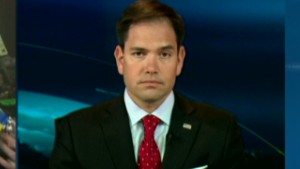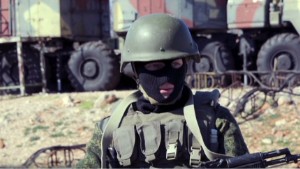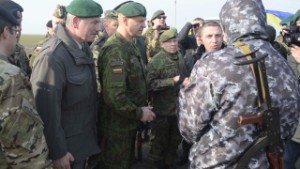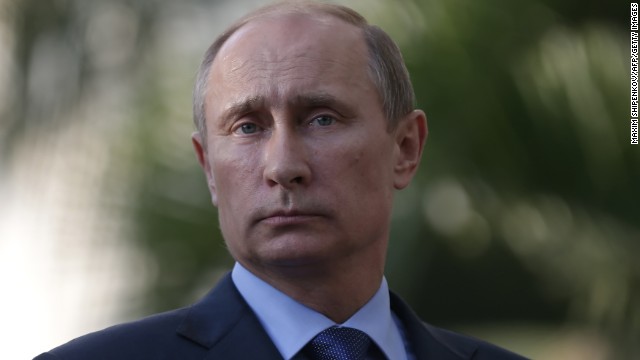Five myths about the Ukraine crisis
March 8, 2014 -- Updated 1359 GMT (2159 HKT)
Editor's note: Aaron
David Miller is a vice president and distinguished scholar at the
Woodrow Wilson International Center for Scholars and was a Middle East
negotiator in Democratic and Republican administrations. Follow him on Twitter.
.
I'm certainly no expert
on Ukraine. I'm not sure before this crisis that I could even name all
of the countries that share its borders. But watching the ticktock of
the debate on the issue this past week, I'm stunned by the lack of
perspective and breathlessness in the discussion.
.
Sadly, I've grown
accustomed to the partisanship. It has become a permanent fixture of our
analytical and policy landscape. But here are several things about the
recent coverage and discussion on Ukraine that even my lack of expertise
won't allow me to accept:
1. We're back in the Cold War

Aaron David Miller
Clearly, none of the
resets have worked with Russian President Vladimir Putin. Whether it was
President George W. Bush looking into his eyes and seeing his soul or
Bob Gates finding a stone-cold killer there, Putin isn't Stalin,
Khrushchev or Brezhnev. That's hardly a shocker. Nor are we still in
that unique period when two superpowers with contrasting ideological
systems under the threat of nuclear war clashed and fought by proxy from
one end of the globe to the other.
There's no doubt that the
United States and Russia have major differences. But the issue is no
longer ideological. Russian capitalism is here to stay, state-controlled
and monitored though it may be. And what ideology exists has more to do
with asserting Russian national interests than anything Marx or Lenin
would have recognized. And in at least one respect, that's too bad. At
least during much of the Cold War, from the 1970s on, there were rules,
do's and don'ts that prevented situations like Ukraine.
We'll continue to
struggle with Putin, to be sure. But the world's too small, the
Europeans too dependent on Russia, and the realities of global
interdependence too deep to imagine hitting the rewind button and
turning the planet into an arena of conflict and competition. Would it
make for a good video game? Yes.
2. Putin is Hitler

Sen. Marco Rubio: Putin blatantly lied

Turmoil continues in Ukraine

OSCE monitors denied entry into Crimea
In the past week, I've
heard people I admire and respect talk about Crimea as Munich and Putin
as Hitler. Twain wrote that history doesn't repeat; it rhymes. But those
rhythmic patterns aren't evident here, either.
When we can't think of
intelligent parallels in analyzing nations who do things America cannot
abide, it seems we're drawn irresistibly to the Hitler trope. The same
thing happens with Iran. And while I don't for a moment condone the
vicious Israel-baiting and hating of the mullahcracy in Tehran (and the
anti-Semitism, too) to bring up Hitler not only trivializes the
monstrosity of the evil and the magnitude of the crimes in his time, it
imposes unrealistic challenges in ours.
The unique challenge of Hitler demanded that he be stopped and the Nazi regime destroyed.
We don't have to like
the Putin government in Russia, or Supreme Leader Ali Khamenei's in
Iran, to recognize that the magnitude of the threat is different. To
compare them to Hitler is to urge the United States into a game that we
don't want to play and can't win.
As best I can figure,
Putin is a clever and easily riled Russian nationalist who presides over
what remains of an empire whose time has come and gone. He lives in
reality, not in some megalomaniacal world. But he is prepared to assert
Russia's interests in spheres where it matters, and to block the West's
intrusion into those areas as best he can. Russia is his "ideology." And
on Ukraine, history and proximity give him cards to play.
This man isn't a
fanatic. Money, pleasure and power are too important to him. Any leader
who is willing to be photographed shirtless on a horse, like some cover
of Men's Health magazine, isn't going to shoot himself in the head or
take cyanide in a bunker. This guy is way too hip (Russian style) and
attached to the good life to be Hitler. And given Russia's own suffering
at the hands of the Nazis, saying he is just makes matters worse.
3. It's all Obama's fault
President Barack Obama
was never the catastrophic incompetent or Satan's finger on earth that
his worst critics imagined nor the redeemer, savior, or great President
that his most avid acolytes wanted. And yet the notion that Obama,
through weak and feckless foreign policy, was responsible for Putin's
move into Ukraine strains credulity to the breaking point.
This urban legend that
because of Benghazi and the "red line" affair in Syria, Putin was
compelled to do something in Ukraine that he wouldn't have done had
Obama acted differently, is absurd. The administration's foreign policy
has often resembled a blend between a Marx Brothers movie and the Three
Stooges. But on this one the charge is absurd, as is the notion that
somehow Obama could have stopped him.
When the Soviet Union
invaded Hungary in 1956, there was no U.S. military response; ditto in
1968 when the Soviets put down Prague Spring in Czechoslovakia.
Sometimes, geography really is destiny. Russia believed its vital
interests in Ukraine were threatened and it had the means, will, and
proximity to act on them. And it's about time we faced up to it.
4. Bombing Syria would have saved Ukraine
This notion that Obama's
opponents have latched onto is, of course, unknowable. There are no
rewind buttons in history. Counterfactuals are prime talking and
debating points because they cannot be proven one way or the other. But
to argue that launching cruise missiles at Syrian military targets
somehow would have deterred Putin from acting on what he perceived to be
a Russian vital interest, or emboldened the Europeans to stand tougher
against him, really is off base.
Syria and Ukraine are
like apples and oranges the President's detractors insist on putting in
the same basket. Even if Obama thought the U.S. had vital interests that
justified an attack on Syria, it is likely it would not have altered
Putin's policy toward Ukraine. The country perceived to be in Russia's
zone of influence and manipulation was drifting westward. And Putin was
determined to stop it.
5. Ukraine can have a 'Hollywood' ending
Are there good guys and
bad guys in the Ukraine-Russian drama? Sure there are. We have
courageous Ukrainian patriots who died in the Maidan for the dignity and
freedom they believed in; corrupt and ruthless government officials who
were willing to use force against their own citizens; Russian
provocateurs eager to stir up trouble; extremist Ukrainian nationalists
who are hardly democrats; and a Russian strongman who hosted the
Olympics one week and invaded the territory of a sovereign country the
next.
I suspect that the
Ukrainian Spring -- if that's what it is -- may turn out better than its
Arab counterpart. But we have to be real. Ukraine may be fractious and
troubled for some time to come.
Below the morality play
there is intense factionalism; regional differences; scores to settle;
Russian manipulation; and a tendency to avoid the kind of compromise
that would lead to real power sharing and good governance.
We like Hollywood
endings. But real democratization depends less on a friendly U.S. or EU
hand than on the emergence of genuine leaders who are prepared to rise
above factional affinities and see a vision for the country as a whole.
It also depends on institutions that reflect popular will and some
mechanism for accommodating differences peacefully without resorting to
violence.
There are no easy or
happy endings here. And we can only make matters worse, as Henry
Kissinger suggested recently, by trying to turn the Ukraine crisis into a
Russia vs. the West (or worse, the U.S.) tug-of-war.


No comments:
Post a Comment